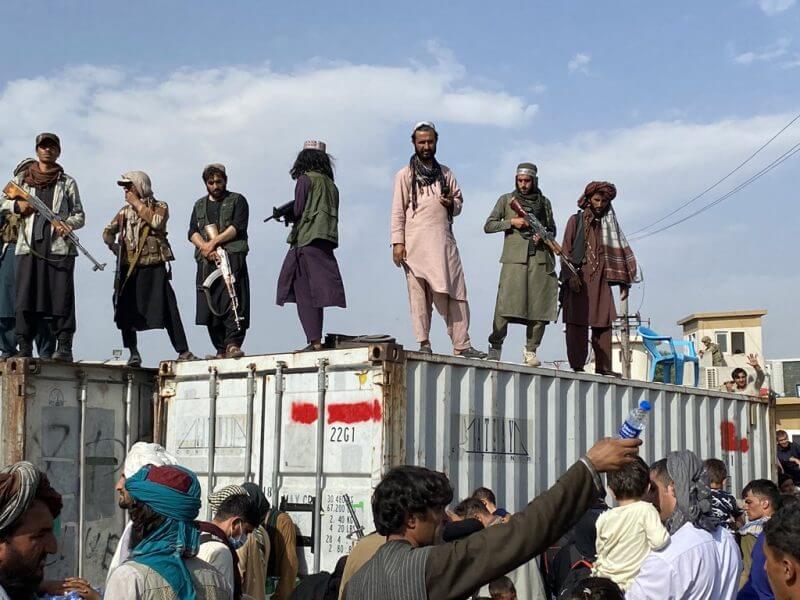
'Why should India-Taliban talks be discreet? Why should we be defensive?'
Foreign policy experts and senior journalists tell The Federal New Delhi must be bold and engage with the new rulers in Afghanistan

India should not be burdened by past experiences and instead must engage the new Taliban government in Kabul, foreign policy experts and senior journalists have said.
The Federal held a webinar broadcast live – moderated by editor-in-chief Srinivasan S and attended by geopolitical expert Rana Banerji, former diplomat M Ganapathi and senior journalists Dakshina Murthy, Seema Guha and Subir Bhaumik – on Saturday to discuss the future of the conflict-ridden nation and the challenges facing India in its immediate neighbourhood following the victory of the Taliban. The panel suggested that, given the long historical relations between India and Afghanistan, there should be no hesitancy on the part of the Indian government to talk to the new rulers in Kabul. The fact that major powers including China, the United States, Russia and Britain have all opened channels of communication with the Taliban make it even more imperative that the India not be seen standing to one side.
Also read: Taliban has a new virulent headache called the Islamic State
Referring to the recent talks between Indian and Taliban officials in Doha, Qatar, Dakshina Murthy said, “The Taliban that ruled Afghanistan in the 1990s and early 2000s were very different [compared to the Talibs who have taken over now].”
“Why should India-Taliban talks be discreet? Why should we be defensive?” he asked. “China is openly engaging with them. It is time that India showed muscle.”
The fact that the Haqqani Network, the ISI-sponsored terrorist group, is expected to play a major role in the new Afghan dispensation should not be a reason to stay on the sidelines, Dakshina Murthy said.
There is a section of the Taliban that is open to having a relationship with India, he said, adding that New Delhi should keep its options open.
Former MEA secretary Ganapathi said that the Pakistani army will have a strong influence in the Afghan government – referring to the Haqqanis – and said India has to “wait and see if the Taliban will be a puppet on a string”.
‘Who is the loser? India is the loser.’
Senior journalist Seema Guha too urged New Delhi to talk to the Taliban. “Who is the loser? India is the loser,” she said, referring to India’s reluctance to talk to Afghanistan’s new rulers.
“In 2001 Pakistan faced the same situation that India is facing now [when the Taliban were ejected from Kabul],” she said.
Guha said that in the past 20 years India has invested more than $3 billion in Afghanistan, on civilian infrastructure such as schools and dams. “We did an excellent job,” she said, referring to big-ticket projects. “We also initiated smaller projects that built people’s lives. India should have realised that you cannot put all your eggs in one basket. They [Indian officials] were very averse to Taliban. Whether it was Hamid Karzai in the beginning or Ashraf Ghani later. In our briefings, what India’s thinking was, that even if Taliban has control of countryside, they will take time coming around to the metropolitan areas,” she said.
Also read: Taliban had it easy so far, now comes the real challenge
Guha said contrary to popular perception, India did try to reach out to Taliban leaders at the local level. “Every time we did, the Pakistanis eliminated that person. But you still have to try and keep lines of communication open. If you wanted to remain relevant you should have talked to them. The US, Russia, the UK, Karzai, Khalil… they are all talking to the Taliban.
“I don’t know why we waited for so long. We should have talked to everyone.”
Guha also said India should continue to support ordinary Afghans who want to leave the country.
“South Block [which houses the Ministry of External Affairs] should have given out e-visas. Not just for Hindus and Sikhs but to every ordinary afghans with some relation with India. We should have brought in more people. We must be seen to be doing something for the people,” she said.
Subir Bhaumik cautioned that Taliban’s victory has given a boost to extremists to the east of India. “The Sheikh Hasina government in Bangladesh is worried about an upsurge in extremist activity thanks to the Taliban’s victory in Afghanistan,” he said, adding there will bet repercussions of India in the east in future.


